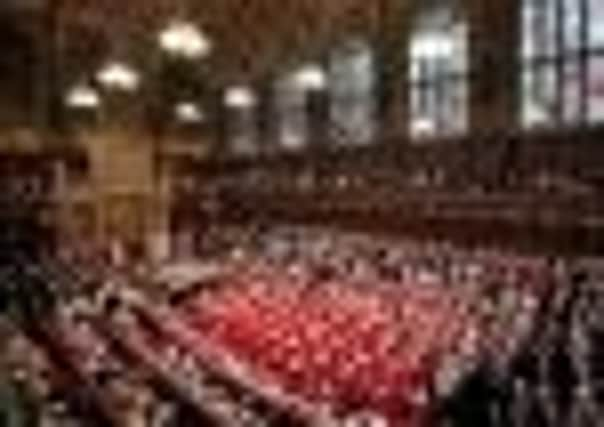Richard Newby: For democracy’s sake, we must reform the Lords


Silly question you might think, but in the UK more than half our lawmakers are unelected. Parliament currently consists of 650 MPs and over 800 peers.
Of the peers, the large majority are appointed for life. But some 90 are hereditary.
Advertisement
Hide AdAdvertisement
Hide AdFor example, Lord Falkland is in the House of Lords because his umpteenth great-grandfather was a chum of James the First in 1620. Why do we still put up with this in the modern age?
First the facts. There are roughly 220 Conservative peers, 240 Labour, 90 Liberal Democrat and 220 crossbenchers (ie non-aligned). There are also 26 bishops (because the Church of England is still the state church).
The party political peers are chosen by their party leaders. The crossbenchers are chosen by a panel of experts and the bishops are there by seniority (so the Bishop of Ripon and Leeds is in; the Bishop of Bradford is not). Once appointed, everyone (except the bishops) is there for life. The decision about how many new peers are created and how the newcomers are split between the parties is taken by the Prime Minister alone.
The system has some strengths. Peers tend to be older, more experienced and less partisan than members of the Commons. They are sometimes extremely distinguished in their professional fields. Because they cannot be removed, they are less beholden to the party Whips, and in the case of the crossbenchers they have no Whip at all.
Advertisement
Hide AdAdvertisement
Hide AdThis gives a degree of objectivity which is difficult to replicate in an elected chamber. As the Lords is unelected, it eventually gives way to the Commons on policy issues. The Commons retains its primacy, which means that, although the Lords can delay legislation, it can’t block it permanently. An elected Lords would not defer to the Commons in the same way.
But against these positives the Lords has many faults. It is extremely old – the average age is 69 and there is no retirement age. So, while many of its members have tremendous expertise, in many cases this is sadly outdated.
It is extremely London-centric. The number based in Yorkshire and the Humber, the North East and the North West is very small. It contains many people who are only there because they made very generous donations to a political party. And most importantly for a democracy, its members are completely unaccountable to anyone.
The Government’s proposals seek to deal with these shortcomings, while retaining some of the Lords’ better features. Some 80 per cent of members would be elected for a single term of 15 years – so that they would need the endorsement of the electorate, but would not be preoccupied by short term political calculations.
Advertisement
Hide AdAdvertisement
Hide AdThey would be elected by proportional representation, in thirds, every five years – so that the Lords really reflected public opinion. Each region would elect members in proportion to its size.
The remaining 20 per cent would be crossbenchers, appointed by an independent commission. The size of the Lords would be reduced to 300. But its formal powers would not change. The Commons would still, for example, have complete control of the country’s finances.
These common sense proposals have been met by howls of outrage from many current members of the Lords. In part, this is because few turkeys vote for Christmas. In part, there is a natural but misguided view that any system which appointed them must, by definition, be perfect. And there is a fear that expertise and wisdom will be replaced by mediocrity and partisanship.
There is also plenty of scope for people to object to individual aspects of the proposed changes – for example the proposed system of proportional representation.
Advertisement
Hide AdAdvertisement
Hide AdMy guess is that, on a free vote, some 75 per cent of the current chamber would vote against the Government’s reform proposals. What chance then that reform will happen?
Given that all three main parties called for an elected Lords in their manifestos, it seems likely that the Commons will vote for the proposals – despite a minority diehard Conservative opposition.
There may be some changes in the details, but the principles will remain. The Lords will vote against. The proposals can then become law only if the Government uses the powers in the 1911 Parliament Act (the measure which restricted Lords’ powers to their present scope) to force the change through against the opinion of their Lordships.
Some will argue that this is draconian – or even unconstitutional – but in my view it is justifiable. We cannot let the unelected Lords dictate to the elected Commons – particularly on such a self-interested cause.
Advertisement
Hide AdAdvertisement
Hide AdWhen the 1911 Parliament Act was passed, it stated that at some point in future the Lords must be “constituted on a popular (ie. elected) basis”. A century on, the time has come to fulfil this promise.
Lord Newby, from Rothwell, is co-chair of the Liberal Democrat Treasury Parliamentary Policy Committee.